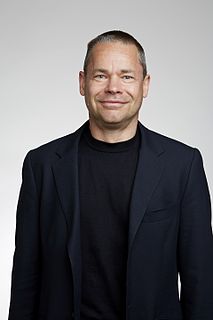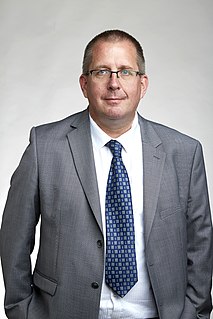Related Research Articles

The Cavendish Laboratory is the Department of Physics at the University of Cambridge, and is part of the School of Physical Sciences. The laboratory was opened in 1874 on the New Museums Site as a laboratory for experimental physics and is named after the British chemist and physicist Henry Cavendish. The laboratory has had a huge influence on research in the disciplines of physics and biology.

Carlos Silvestre Frenk is a Mexican-British cosmologist and the Ogden Professor of Fundamental Physics at Durham University. His main interests lie in the fields of cosmology, galaxy formation and computer simulations of cosmic structure formation.
Ekhard Karl Hermann Salje, FRS is Professor of Mineralogy and Petrology and former Head of the Department of Earth Sciences, Cambridge University.

The Department of Physics and Astronomy at the University of Manchester is one of the largest and most active physics departments in the UK, taking around 250 new undergraduates and 50 postgraduates each year, and employing more than 80 members of academic staff and over 100 research fellows and associates. The department is based on two sites: the Schuster Laboratory on Brunswick Street and the Jodrell Bank Centre for Astrophysics in Cheshire, international headquarters of the Square Kilometre Array (SKA).

Richard Edward Taylor,, was a Canadian physicist and Stanford University professor. He shared the 1990 Nobel Prize in Physics with Jerome Friedman and Henry Kendall "for their pioneering investigations concerning deep inelastic scattering of electrons on protons and bound neutrons, which have been of essential importance for the development of the quark model in particle physics."
John Derek Dowell FRS is a British physicist, emeritus professor at University of Birmingham.
Ian Alexander Walmsley FRS is Provost of Imperial College London where he is also Chair of Experimental Physics. He was previously pro-vice-chancellor for research and Hooke Professor of Experimental Physics at the University of Oxford, and a professorial fellow at St Hugh's College, Oxford. He is also director of the NQIT hub within the UK National Quantum Technology Programme, which is led by the University of Oxford. He is also a Fellow of the Institute of Physics, the American Physical Society and the Optical Society of America.

David George Charlton is Professor of Particle Physics in the School of Physics and Astronomy at the University of Birmingham, UK. From 2013 to 2017, he served as Spokesperson of the ATLAS experiment at the Large Hadron Collider at CERN. Prior to becoming Spokesperson, he was Deputy Spokesperson for four years, and before that Physics Coordinator of ATLAS in the run-up to the start of collision data-taking.

Martin Bodo Plenio is a German physicist, Alexander von Humboldt Professor, and Director of the Institute for Theoretical Physics at Ulm University.
Bryan Ronald Webber, FRS, FInstP is a British physicist and academic. He was a Fellow of Emmanuel College, Cambridge from 1973 to 2010, and Professor of Theoretical Physics at the University of Cambridge from 1999 to 2010. He has been awarded the Dirac Medal by the Institute of Physics, the Sakurai Prize by the American Physical Society and the High Energy and Particle Physics Prize by the European Physical Society.
Sigfried Bethke is a German physicist and science manager.
Gerhard Theodor Materlik is a German physicist and science manager. He has made significant contributions to X-ray physics, notably improvements in the real-world application of synchrotron radiation. He is a Professor of Facilities Science at the University College London since 2013.

David John Wales FRS FRSC is a professor of Chemical Physics, in the Department of Chemistry at the University of Cambridge.
Robin Marshall is an Emeritus professor of Physics & Biology in the School of Physics and Astronomy at the University of Manchester.
Jennifer Anne Thomas,, is a British experimental particle physicist and professor at University College London. She has been a pioneer in the development of particle detectors, and the recipient of the Michael Faraday medal and prize in 2018 for her "outstanding investigations into the physics of neutrino oscillations".

Guy Roderick Wilkinson is a particle physicist, working on the Large Hadron Collider project at CERN, professor of physics at the University of Oxford and a Fellow of Christ Church, where he holds the college's Alfred Moritz Studentship.
Alexandre Obertelli is a French experimental nuclear physicist and Alexander von Humboldt Professor of Experimental Nuclear Structure Physics at the Institute of Nuclear Physics of the Technische Universität Darmstadt.
The Alexander von Humboldt Professorship is an academic prize named after Alexander von Humboldt and awarded by the Alexander von Humboldt Foundation since 2008. The prize is intended to attract internationally leading scientists from abroad to Germany so that they can carry out top-level research there and strengthen Germany as a research location. The prize includes a permanent full professorship at the hosting university, plus 5 million euros for experimentally working scientists or 3.5 million euros for theoretically working scientists. This makes it the most highly endowed research prize in Germany, and possibly world-wide. A maximum of ten Alexander von Humboldt Professorships can be awarded every year to researchers of all disciplines. From 2020 to 2024, an additional six Humboldt Professorships in the field of artificial intelligence can be awarded each year.
Sharon Jeanette Macdonald is a British anthropologist and museologist.
Marialuisa Aliotta is an Italian experimental nuclear astrophysicist whose research uses particle accelerators located deep underground to investigate the nuclear reactions within stars, nucleosynthesis, and the connections between these reactions and the lifetime and evolution of stars. She is a professor at the University of Edinburgh, where she holds a personal chair in experimental nuclear astrophysics.
References
- 1 2 "Brian Foster". Royal Society. 19 September 2015. Retrieved 17 March 2019.
- ↑ "Brian Foster". University of Oxford Department of Physics. 24 February 2011. Retrieved 17 March 2019.
- ↑ "Brian Foster". Deutsches Elektronen-Synchrotron DESY. Archived from the original on 23 April 2018. Retrieved 18 March 2019.
- 1 2 "Humboldt Professur – Alexander von Humboldt-Professor Dr. Brian Foster FRS". DESY. 12 March 2019. Retrieved 18 March 2019.
- ↑ "Brian Foster". Alexander von Humboldt-Professur (in German). Retrieved 18 March 2019.
- ↑ "Brian Foster". Institute of Physics. 2020. Retrieved 26 April 2022.